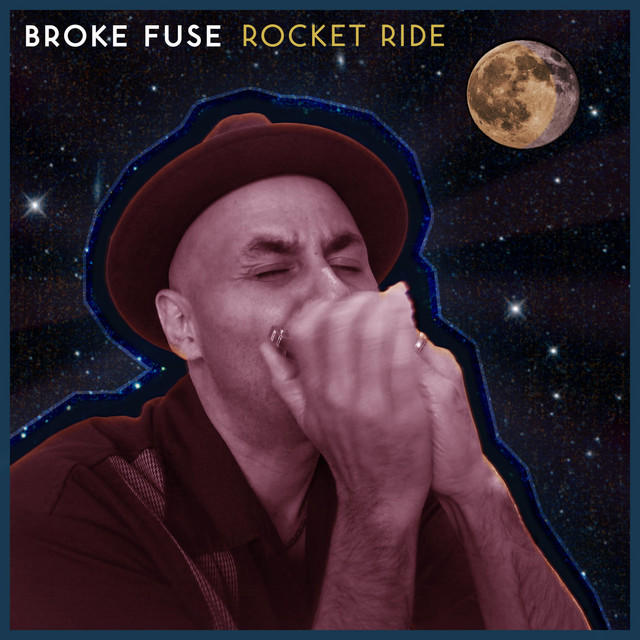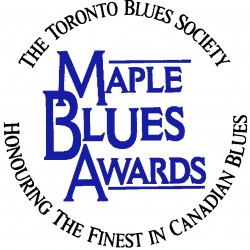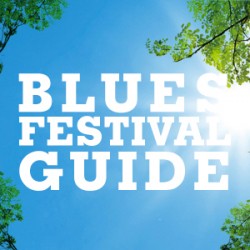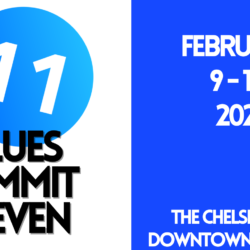Broke Fuse – Rocket Ride
Like in all forms of music, there will always be the debate between modern and old school, just as there will always be those who strive to connect the two, and in doing so create new and compelling music that appeals to the educated ear. That is Rocket Ride in a nutshell.
Jay Moonah has been honing his craft as a harmonica player, singer and songwriter in the hard and fast blues scene of Toronto, Ontario for years. The hallmark of his music is his vibrant harmonica (although he is a multi-instrumentalist), his brilliant songwriting and the sonic diversity he can create with such apparent ease.
Due to COVID-19 lockdown, this album, like its predecessor (Why Should I Be Blue) was recorded entirely remotely. Which also belies the talent of Jay Moonah as an organizer and producer.
The album opens with an old school stomp that is just over one minute of pure joy expressed by harmonica and tambourine. If you close your eyes, you can almost see the shadowy figure of a swamp girl dancing around a bon fire, hair tossing seductively, with wild abandon in time with the music. This is followed by the title track, which is the perfect expression of the feel for this album. Featuring contributions from vocalist Debbie Fleming and guitarist Mike McKenna, the energy of this cut is matched only by the clean production value, which is nothing short of impressive, especially considering the whole album was recorded remotely.
Up next, the third cut on the album “Strawberry Moon” creates a sonic landscape of the red moon rising in the starry night sky. A beautifully crafted statement of the chaotic change we endure under a sky that remains impassive and unchanged. The fourth cut is a rockin’ little toe tapper called “One Shot” that gives off a 50’s vibe, updated from the middle of the 20th century and dropped smack dab in the middle of the 21st.
Up next is the slinky groove of “Sting Ray Blues”, with Jay’s magical embellishment on Organ (I did say he is a multi-instrumentalist). This is followed by the sixth cut, and probably the most experimental on the album. “Agitation (For The Common Good Part 1)” has an almost prog feel to it reminiscent of the YES classic “Close To The Edge”. It certainly is a blues that wanders completely outside the box.
Up next, a beautifully retro sounding cut called “Hear The Rain”, a light and breezy little ditty that give Jay a chance to break out the ukulele. Maybe I am crazy (No ‘Maybe’ about it) but I get a distinct flavor of “Rain Drops Keep Falling On My Head” buried deep down in this track. The eighth track on this album is “Miss You When I’m Gone”, a rockin’ little number that runs down the long roads that touring blues players often have to take. An expression of the frantic lifestyle and the effects it can have.
Up next is the smoky ballad “Stolen Time”, a lost and lonely stroll through the sonic landscape of perilous relationships. It is followed by the wild and lively “I Don’t Care”, a brilliant counterpoint to the previous cut it, smashes and dashes in frantic fashion, a minute and 46 seconds of pure up tempo genius.
The next cut is the delightful instrumental, “Los Detalles Del Diablo”. Short, sweet and to the point, the title is “The Devil is in the Details”. For the album closer, “The Ballad of Sonny Shade”, Jay remotely assembled a collective of players to share an open jam that is a perfect ending to this musical Rocket Ride.
As a follow up to “Why Should I Be Blue”, this latest effort is an expansion of the sonic landscape of its predecessor and the next logical step in the growth and development of Jay Moonah as singer, song writer and a player. But more than that it is an expression of the growth he has shown as an artist in a very tough market.
I can’t wait to see what he does next. . (Terry Parsons)










